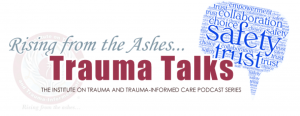Trauma Talks, The Institute on Trauma and Trauma-Informed Care Podcast Series
 Now more than ever, as communities are facing both the COVID-19 pandemic, and the ongoing crisis of racial injustice and police violence, there are even more significant needs for support across communities and within the workforce that supports children and families. The Trauma Talks series, which includes interviews with providers and survivors of trauma across 13 categories, includes powerful personal and professional stories about how strength and resilience can heal and prevent trauma. We are highlighting two of the interviews below and encourage you to check out other episodes:
Now more than ever, as communities are facing both the COVID-19 pandemic, and the ongoing crisis of racial injustice and police violence, there are even more significant needs for support across communities and within the workforce that supports children and families. The Trauma Talks series, which includes interviews with providers and survivors of trauma across 13 categories, includes powerful personal and professional stories about how strength and resilience can heal and prevent trauma. We are highlighting two of the interviews below and encourage you to check out other episodes:
Mental Health – Francoise Mathieu, TEND Academy (Provider)
At least 60% of those in helping professions have a history of trauma and adversity which aligns with the high rates of stress pervasive in many human service organizations and agencies. Understanding how personal lived experience and professional exposure to trauma impact the workforce is a crucial part of trauma-informed care. Mathieu describes the work of the TEND Academy and clarifies key terms related to trauma-informed approaches that support the workforce.
Compassion Fatigue – profound physical and emotional erosion of empathy, making it difficult engage empathically with those in need for whom you are caring. Often results from a large volume of requests for support
Secondary or vicarious trauma – indirect exposure to trauma through baring witness to traumatic events either through hearing others’ stories, case consultation, or other similar interactions. An accumulation of secondary exposures overtime can influence how individuals engage with the world
Burnout – Refers specifically to the working conditions such as hours worked, supervision quality, compensation. Burnout happens in all occupations and all settings.
COVID-19 – Jesse Kohler, North Light Community Center and Campaign for Trauma-Informed Policy Practice (CTIPP) (Provider/Survivor)
Amid the COVID-10 pandemic, individuals and organizations are discovering new possibilities and opportunities for well-being and care as a result of prioritizing safety and trauma-informed approaches. Kohler describes how modeling these values and prioritizing health and well-being at all levels – among staff, clients, and the entire organization –creates trust at a time when there is significant distrust of many systems. Creating a culture of transparency and honesty by holistically committing to support staff by creating opportunities for choice and empowerment demonstrates the level of care needed to sustain an organization, its people, and the community it serves during a crisis like COVID.


